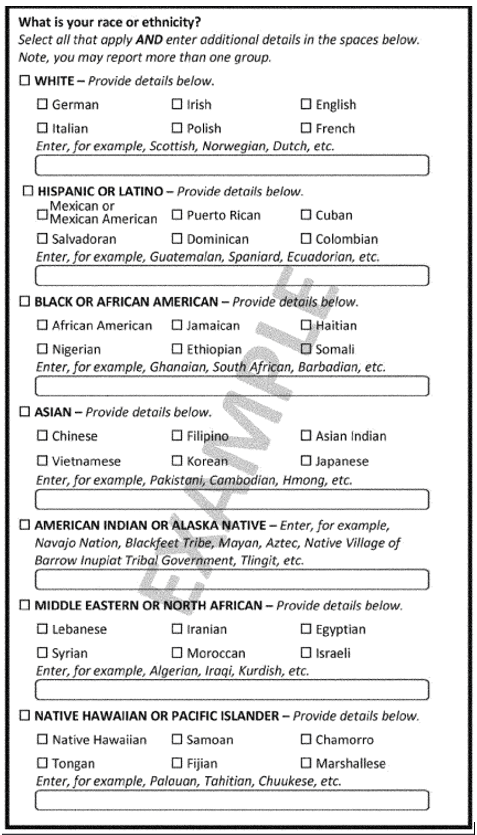Who lives, who dies, who tells your story? This question is front and center for health care data as the Office and Management and Budget (OMB) works to finalize revised federal standards for demographic data collection on race and ethnicity this month.
For over thirty years, the federal government has used the same standards to capture data on the race and ethnicity of participants in federally-funded programs and activities, including health programs like Medicaid and CHIP. These standards also set the pace for how demographic data is collected in state and local programs, as well as for private entities that work closely with government programs, such as health insurance companies, hospitals, and providers. The standards require use of the following question stems and responses, which will be familiar to anyone reading this blog:
What is your ethnicity?
- Hispanic or Latino
- Not Hispanic or Latino
What is your race?
- American Indian/Alaska Native
- Asian
- Black/African American
- Native Hawaiian or Other Pacific Islander
- White
- Other/Some Other Race
Federal, state, and local programs, as well as private entities, use these questions to collect data that can show important differences and distinctions in health care access, experiences, and outcomes. But how this data is collected greatly influences whose experiences count.
OMB’s proposed revision to the standards would combine the two questions into one combined question that asks about race, ethnicity, and tribal affiliation. Research and testing demonstrates that a combined question results in a greater number of individuals selecting a specific race, ethnicity, or tribal affiliation, or combination thereof, as opposed to marking “Other,” which provides no usable information. The revision would also add Middle Eastern/North African (MENA) as an ethnicity response option in the combined question. Under the current standards, MENA individuals are often marked as “White,” which masks the unique experiences of MENA individuals and fails to acknowledge how MENA individuals see themselves.
Maybe most significantly, the proposed revision will by default require use of a question with more detailed response options and an open text box within each larger racial or ethnic category. This change will allow individuals more agency and autonomy over their responses, allowing people to select as many responses as are relevant to them and add in any information that is not reflected in the response options provided. It will also allow programs, agencies, and any other entities that use this question to study trends and develop a broader understanding of multidimensional, intersectional populations.
The combined question with detailed response options looks as follows:

NHeLP supports these changes, which we believe will improve the quality of race, ethnicity, and tribal affiliation data that federal health programs and agencies, along with their state, local, and private partners, receive from respondents. Data collected using these standards is used to stratify health care quality measures—such as how many children enrolled in CHIP have received preventive screenings—and monitor usage of services by various racial and ethnic groups—such as COVID-19 vaccine uptake by race in the Medicaid program. By improving the standards under which this data is collected, OMB will enhance the work that health programs and entities are doing to improve actionable information on which populations benefit from, or lack access to, its programs and services; monitor and address disparities in access and quality; enforce civil rights; tailor culturally and linguistically competent outreach and services to specific communities; and ultimately, improve health outcomes for all individuals enrolled in its programs.
NHeLP has asked its partners to consider signing on to a letter in support of OMB’s proposed changes. For organizations wishing to sign on, please view that letter and sign on here. Individuals wishing to submit a comment in support can do so through our comment portal.
